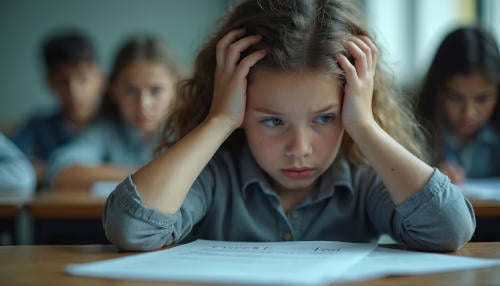Nearly one-third of 16-24 year olds in the UK (31%) reported some evidence of depression or anxiety in 2017/2018. This is up from the previous year (26%).
https://www.mind.org.uk/about-us/our-strategy/doing-more-for-young-people/facts-and-figures-about-young-people-and-mental-health/
Anxiety is palpable for many children. There are many SEND (Special Educational Needs and Disabilities) that can also increase the likelihood of it occurring.
Anxiety can also be defined solely within SEMH (Social and Emotional Mental Health) and does not always exist alongside another SEND.
What SEND causes Anxiety in School?

Firstly, we may see anxiety in children diagnosed with the following:
Autism: Autistic children may experience anxiety caused by attempts to wriggle into a neurotypical culture due to:
- Social interaction: fearing rejection of their interactive responses.
- Masking: autistic children may camouflage neurodiverse tendencies.
- Managing sensory issues. Sensory overload and/or avoidance can be stressful.
- Routine changes: potential alarm caused by something new, such as a new teacher or procedure.
ADHD: Symptoms of ADHD can initiate surges in anxiety due to:
- Brain chemical alterations affecting mood
- Poor focus, causing missed learning
- Consequences of rule-breaking
- The result of impulsivity
- Poor organisation
- Masking
Dyslexia: A dyslexic child may anticipate daily challenges with their learning skills, raising angst at school.
Dycalculia: A difficulty working with numbers can be a struggle as a child confronts maths daily in school.
Other Causes of School Anxiety

School Culture: Some children experience EBSA, (Emotional Based School Avoidance), potentially increasing anxiety due to a:
• Fear of errors
• Inability to cope with work/teacher expectations
• Friendship difficulties
• Sensory overload
Trauma: Children with trauma may endure sadness, disengagement, aggression, social isolation, and friendship issues.
Obsessive Compulsive Disorder (OCD): Intrusive, continual, unwanted, and often irrational thoughts can cause significant distress.
Penny is from Middlesex. She is mum to Paulo, who experienced a trauma and developed OCD. He suffered significant anxiety at school. She explains, “He struggled with concentration and horrible thoughts. In addition, his excessive checking of everything exhausted him; it was such an effort just to encourage him to actually attend school, let alone achieve anything. Afterwards, he would repeatedly ruminate over the day’s events.”
How Teachers and Parents Can Help

Teachers can play a crucial role in supporting children with anxiety. Some key ways are:
Who has SEND? An awareness of who has anxiety is advantageous; your school SENCO will know who these children are.
Regularity: Ensuring a consistent class routine can help soothe anxious tendencies. As a parent, it can be advisable to inform a child of any changes happening at home, if possible.
Time out: If a student becomes dysregulated, a teacher could inconspicuously ask if they need a time-out. At home, it is useful for a child to have the option to talk or retreat to a quiet space.
Visual objectives: Visual resources in class will give anxious children the best chance to stay on task whenever possible.
Simplified tasks: A modified version of a lesson can be made available if needed, which can ease heightened stress.
Tone: A soft intonation can soothe an anxious child.
Relaxation: Encourage relaxation. Beginning the day with a deep breathing technique can be highly effective.
Social skills: Practising assertiveness, communication, social and problem-solving skills via role-play scenarios can be beneficial.
Communicating needs: Ensure children can easily inform their teacher/parent without judgement, if anxious. In school, this could be via a “think book.” For an immediate route, the student could use a visual clue on their desk, such as a specific pink rubber, to let you know they are anxious.
Empathy: Remember why your child/pupil becomes anxious. Use of empathy helps us respond more sensitively.
Medication: It is worth a chat with your GP to see if anything could medically help your child’s anxiety.
Penny learnt to talk openly to her son about his difficulties. He also sees an Educational Psychologist in school.
“Sometimes school tipped Paulo over the edge; I couldn’t help him. Gradually, I have learnt ways to approach conversations with him and how not to push it too far. We can discuss what triggers his anxiety and different ways to approach it.”
“When Paulo saw an Educational Psychologist, something shifted. She made excellent suggestions; practising mindfulness techniques daily has been massive for Paulo. He also has a time-out card in class where he can go to the student support room. He’s also more able to talk to his form teacher and another senior member of staff.”
“Paulo is on antidepressants. It took time to adjust the dose, but when we look back 18 months ago, to where he is now, it is quite a dramatic change. Things are much more manageable, and he is happier. He even enjoys some parts of the school day now and can accept anxious periods.”
Don’t Forget About You

Look inwards. If your own mental health is nurtured, it will be easier to care for others. It could help to consider the following:
- Practising mindfulness/meditation
- Accepting that what you do is enough
Talking to trusted friends and/or joining a support group to meet like-minded people. Access to groups is available on social media channels, particularly on Facebook.
Taking care of your emotional needs will leave you more prepared to embrace the needs of your child. Please see the links below that you may find useful.
Useful Websites:
https://www.anxietyuk.org.uk/resources/
https://www.allaboutkids.uk/kids
https://www.youngminds.org.uk/
Please note: The information provided within this blog, by SENsational Tutors, is for general information purposes only. We appreciate that every person is unique and any advice/experiences mentioned within the content of each blog may not be reflective of your own personal experience. All information on the site is provided in good faith and is for educational informational purposes only. It is not a substitute for professional advice. Before taking any actions based upon such information, we encourage you to consult with appropriate professionals.




